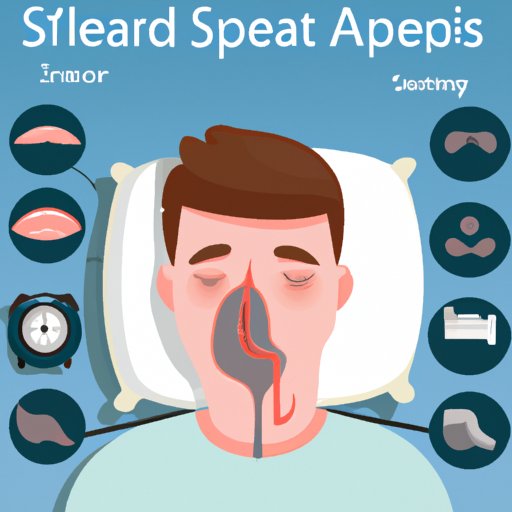
Introduction
Sleep apnea is a common sleep disorder that affects millions of people around the world. It is characterized by pauses in breathing during sleep, which can lead to a variety of symptoms that impact daily life. In this article, we will explore the symptoms of sleep apnea and why it’s important to recognize them early on.
The Telltale Signs of Sleep Apnea: Recognizing the Symptoms
There are a variety of symptoms that can indicate sleep apnea. These include:
- Loud snoring
- Gasping or choking during sleep
- Pauses in breathing during sleep
- Feeling tired after a full night’s sleep
- Waking up with a headache
- Feeling irritable or moody during the day
- Difficulty concentrating or remembering things
If you or a loved one are experiencing any of these symptoms, it’s important to take them seriously. Sleep apnea can lead to more serious health problems if left untreated, so recognizing the symptoms early on can make a big difference.
How to Identify Sleep Apnea: Common Symptoms to Look Out For
Let’s take a closer look at some of the common symptoms of sleep apnea.
Loud snoring
Loud, persistent snoring is one of the most common symptoms of sleep apnea. This occurs when the airway becomes partially blocked during sleep, causing vibrations in the throat that lead to snoring. It’s important to note that not all snoring is a sign of sleep apnea, but if it is accompanied by other symptoms, it should be taken seriously.
Gasping or choking during sleep
Gasping or choking sounds during sleep are another sign of sleep apnea. This occurs when the airway becomes completely blocked, causing the person to wake up gasping for air. This can be a frightening experience and should be addressed immediately.
Pauses in breathing during sleep
Pauses in breathing, also known as apneas, are the hallmark symptom of sleep apnea. These pauses can last for several seconds to a minute and can occur multiple times per hour throughout the night.
Feeling tired after a full night’s sleep
People with sleep apnea often wake up feeling tired, even after a full night’s sleep. This is because the pauses in breathing disrupt the sleep cycle, preventing the person from reaching deep, restful sleep.
Waking up with a headache
Headaches that occur upon waking are another common symptom of sleep apnea. These headaches are often caused by the decrease in oxygen levels during the night.
Feeling irritable or moody during the day
People with sleep apnea often feel irritable or moody during the day due to the lack of quality sleep. Sleep is essential for regulating mood, so when it’s disrupted, it can impact mental health.
Difficulty concentrating or remembering things
Difficulty concentrating or remembering things is another symptom of sleep apnea. The brain needs restful sleep to function properly, so when sleep is disrupted, it can impact cognitive function.
If you are experiencing any of these symptoms, it’s important to talk to your doctor. They can help you determine if sleep apnea is the cause and recommend appropriate treatment options.
What You Need to Know About Sleep Apnea: Symptoms and Warning Signs
In addition to the symptoms listed above, there are some important things to know about sleep apnea.
Diagnosis and Treatment
Sleep apnea is typically diagnosed through a sleep study, which monitors breathing patterns and other physiological functions during sleep. If diagnosed, treatment options may include lifestyle changes, such as weight loss or quitting smoking, or the use of a continuous positive airway pressure (CPAP) machine during sleep.
Health Risks
If left untreated, sleep apnea can lead to cardiovascular problems, diabetes, and other serious health issues. It’s important to seek treatment if you or a loved one is experiencing any symptoms of sleep apnea.
Risk Factors
There are several risk factors associated with sleep apnea, including:
- Obesity
- Smoking
- Older age
- Family history
- Being male
If you have any of these risk factors, it’s especially important to be aware of the symptoms of sleep apnea and talk to your doctor if you experience any of them.
Struggling to Sleep? It Could Be Sleep Apnea: Learn the Symptoms
Sleep apnea can also impact the quality of sleep, leading to additional symptoms such as insomnia or other sleep disorders. People with sleep apnea may find it difficult to fall or stay asleep, waking up frequently throughout the night.
In addition, sleep apnea can lead to daytime fatigue and drowsiness, making it difficult to focus at work or engage in daily activities. This can impact overall quality of life and lead to increased stress levels.
A Comprehensive Guide to Sleep Apnea Symptoms: What You Should Know
If you are experiencing any of the symptoms listed above, it’s important to talk to your doctor. Keeping a journal of your symptoms can be helpful in identifying patterns over time.
It’s also important to maintain a healthy lifestyle, which can help reduce the risk of sleep apnea. This includes regular exercise, maintaining a healthy weight, and not smoking.
If you are diagnosed with sleep apnea, treatment options are available. It’s important to work with your doctor to find the best treatment plan for you.
Don’t Ignore These Signs: Understanding the Symptoms of Sleep Apnea
Recognizing the symptoms of sleep apnea early on can make a big difference in overall health and wellbeing. If you or a loved one are experiencing any of these symptoms, don’t wait to seek help.
Talk to your doctor and work together to find the best treatment plan. With the right support and resources, you can manage sleep apnea and improve your overall quality of life.
Conclusion
Sleep apnea is a common sleep disorder that can impact daily life in a variety of ways. Recognizing the symptoms early on can make a big difference in overall health and wellbeing. It’s important to talk to your doctor if you are experiencing any symptoms of sleep apnea and work together to find the best treatment plan.




